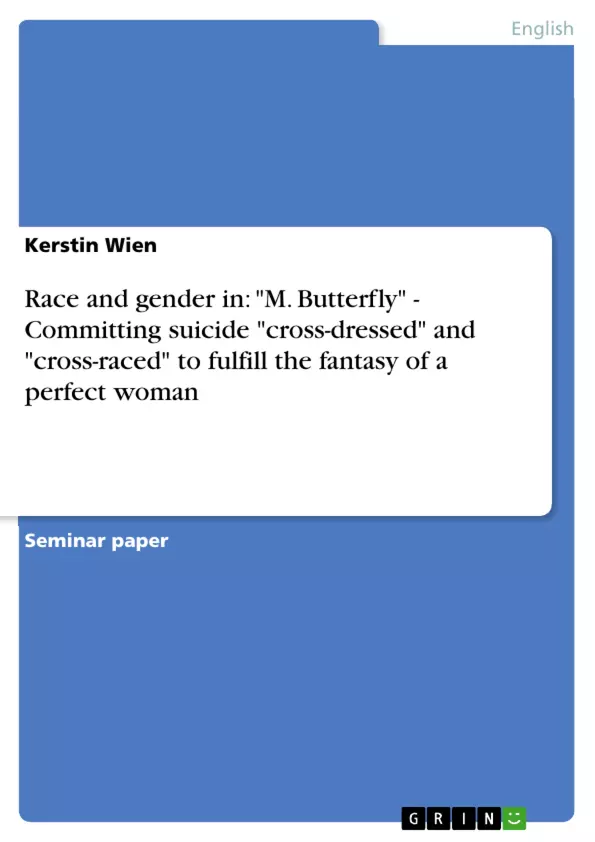1. Introduction
The figure in the middle of the high room seems to be alone, despite all the people around him. He (apparently a male person) kneels on a kind of a stage wearing a kimono and a wig. It must be a prison, because all the people around wear prison clothing. Like spectators in an arena (or in a theatre) the prisoners occupy the balconies above, and the space in front of the stage. He starts to speak:
"I have a vision. Of the Orient. That, deep within her almond eyes, there are still women. Women willing to sacrifice themselves for the love of a man. Even a man whose love is completely without worth."
In my paper I want to show, how Eng′s text can help to analyze three particular passages of David Cronenberg′s movie to look behind Gallimard′s psyche. I will take those three sequences which appear in chronological order in the film, and apply parts of Eng′s theory on them. How does Gallimard manage the situations, and why "it is, after all, only through Gallimard′s sustained identifications with and Song′s sustained investments in conventional stereotypes and fantasies of the Oriental geisha that Hwang′s drama can unfold to its pitiable end." Doing this, I am also briefly going to look on certain cinematic techniques (especially the setting of light in the first scene I have chosen) to find out, how David Cronenberg interprets Hwang′s Drama and how he creates Gallimard′s psyche, Gallimard′s feelings for Song, and how Cronenberg deals with the question of gender and race. And finally, I will raise the question, if Gallimard is homosexual. Does Eng′s theory give a proper answer for that or can that question be solved, though Eng does eventually not give any answers.
Inhaltsverzeichnis (Table of Contents)
- Introduction
- Three scenes
- The first meeting
- The second scene - living the fantasy
- The death scene – a failing fantasy needs to be saved
- Conclusion
Zielsetzung und Themenschwerpunkte (Objectives and Key Themes)
This paper aims to analyze the character of René Gallimard in David Cronenberg's film "M. Butterfly," using David L. Eng's theory of "Racial Castration: Managing Masculinity in Asian America." The analysis will focus on three specific scenes from the film, examining how Eng's theory helps to understand Gallimard's psyche, motivations, and reactions.
- Orientalism and the construction of the "Exotic East"
- The role of stereotypes in shaping Gallimard's perceptions
- The relationship between gender, race, and identity
- The impact of the "Butterfly Fantasy" on Gallimard's life
- The significance of Gallimard's suicide
Zusammenfassung der Kapitel (Chapter Summaries)
- Introduction: This chapter introduces the paper's focus on analyzing René Gallimard's character in David Cronenberg's "M. Butterfly" through the lens of Eng's theory of "Racial Castration." It highlights Gallimard's fascination with the "Oriental" woman and the connection between his suicide and the collapse of his fantasy.
- The First Meeting: This chapter analyzes the first meeting between Gallimard and Song, emphasizing how Gallimard's initial stereotypes about the "Exotic East" and the "submissive Oriental woman" are reinforced through the narrative of Puccini's "Madame Butterfly." The chapter further explores the cinematic techniques used by Cronenberg to emphasize Gallimard's growing fascination with Song, including the use of close-ups and the manipulation of light.
Schlüsselwörter (Keywords)
The central keywords and concepts of this paper revolve around Orientalism, gender, race, and identity in the context of David Cronenberg's "M. Butterfly." Key themes include the construction of stereotypes, the impact of fantasy, and the relationship between masculinity, femininity, and racialized perceptions. The analysis employs the theoretical framework of "Racial Castration" to understand Gallimard's behavior and the implications of his actions.
Frequently Asked Questions
What is the central theme of the movie "M. Butterfly"?
The film explores the complex relationship between gender, race, and identity, focusing on Gallimard's obsession with a "perfect woman" who is actually a man.
How does David L. Eng's theory apply to Gallimard?
Eng's theory of "Racial Castration" helps analyze Gallimard's psyche and how he manages his masculinity through Orientalist fantasies.
Why does Gallimard commit suicide?
The paper suggests he commits suicide to fulfill the fantasy of the "Butterfly" (the submissive Oriental woman) when his real-life illusion collapses.
What role does Puccini's "Madame Butterfly" play in the film?
The opera serves as the foundational stereotype for Gallimard's perception of Song Liling as an "exotic" and "sacrificing" geisha.
Is Gallimard homosexual according to the analysis?
The paper raises this question and explores whether Gallimard's feelings are driven by sexual orientation or by a deep-seated racial and gendered fantasy.
How does David Cronenberg interpret the drama?
Cronenberg uses specific cinematic techniques, such as lighting and setting, to emphasize Gallimard's psychological state and his detachment from reality.
- Citar trabajo
- Kerstin Wien (Autor), 2002, Race and gender in: "M. Butterfly" - Committing suicide "cross-dressed" and "cross-raced" to fulfill the fantasy of a perfect woman, Múnich, GRIN Verlag, https://www.grin.com/document/12530



